|
|
|
Sort Order |
|
|
|
Items / Page
|
|
|
|
|
|
|
| Srl | Item |
| 1 |
ID:
124248
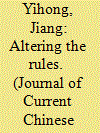

|
|
|
|
|
| Publication |
2013.
|
| Summary/Abstract |
This study looks at Chinese homeowners' participation in policymaking. Drawing on evidence from Guangzhou and Beijing, it shows that various organised homeowner activists have moved upstream in the policy process and have begun to push beyond policy implementation into the domain of agenda setting and "rule-making". These advocates display rights-conscious patterns of behaviour that are closer to that of interest or lobby groups than to the typical repertoire of Chinese contentious citizens. The study suggests that this kind of political participation is on the rise amongst Chinese homeowner activists. This result complements and extends other recent findings that suggest the Chinese policy process is gradually opening up. Such a trend could have significant implications and calls for more research in different domains of state-society relations.
|
|
|
|
|
|
|
|
|
|
|
|
|
|
|
|
| 2 |
ID:
105169
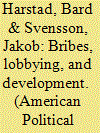

|
|
|
|
|
| Publication |
2011.
|
| Summary/Abstract |
When faced with a regulatory constraint, firms can either comply, bribe the regulator to get around the rule, or lobby the government to relax it. We analyze this choice, and its consequences, in a simple dynamic model. In equilibrium, when the level of development is low, firms are more inclined to bend the rule through bribery but they tend to switch to lobbying when the level of development is sufficiently high. Bribery, however, is associated with holdup problems, which discourage firms from investing. If the holdup problems are severe, firms will never invest enough to make lobbying worthwhile. The country may then be stuck in a poverty trap with bribery forever. The model can account for the common perception that bribery is relatively more common in poor countries, whereas lobbying is relatively more common in rich ones.
|
|
|
|
|
|
|
|
|
|
|
|
|
|
|
|
| 3 |
ID:
171650


|
|
|
|
|
| Summary/Abstract |
The paper summarises the evolution of the iron triangle of the mutual relationships amongst the ministry of defence, defence industry, and the political elite in the post-communist Czech Republic in 1990-2020. The essay stresses the oddness of this relationship. On the one hand, the government is bound by a partnership to the Defence and Security Industry Association of the Czech Republic (DSIA), a lobbying group of more than 100 organisations that conduct business in defence and security sector in Czechia. Yet, since its creation in 2000, this assemblage of industries within DSIA's market position is falling, in fact. Neither political parties in power, nor the governments have been able to support national defence industry through the small military. Just a few DSIA national members are able to compete internationally with their cutting-edge products. Others have evolved into middlemen trading intime-expired Czechoslovak equipment retired from the Czech Armed Forces.
|
|
|
|
|
|
|
|
|
|
|
|
|
|
|
|
| 4 |
ID:
160941
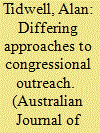

|
|
|
|
|
| Summary/Abstract |
Both Australia and New Zealand, in addition to engaging with the US executive branch, also protect and advance their bilateral relationship by engaging with the US Congress. Since 1987, Australia has pursued congressional outreach, or diplomatic lobbying, to protect and advance its security and trade interests. As a result, Australia has won both security and trade benefits. New Zealand's congressional outreach, on the other hand, has had a more challenging task of improving bilateral relations due, in part, to US objections to New Zealand's anti-nuclear policy. This article extends existing research on Australian and New Zealand congressional outreach, develops a framework for examining embassy-based congressional outreach and, through comparative analysis of Australian and New Zealand congressional outreach, gives greater insight into the nature and character of their efforts on Capitol Hill.
|
|
|
|
|
|
|
|
|
|
|
|
|
|
|
|
| 5 |
ID:
172841
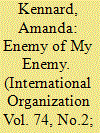

|
|
|
|
|
| Summary/Abstract |
Policies to mitigate global climate change entail significant economic costs. Yet a growing number of firms lobby in favor of regulation to mitigate carbon emissions. Why do firms support environmental regulations that directly increase production costs? This question is all the more puzzling in a globalized economy where regulation may undermine the competitiveness of domestic firms at home and abroad. By imposing differential costs on participants in the domestic market, policies designed to mitigate carbon emissions shift market share toward firms with low anticipated adjustment costs. I develop and test a model of climate change policymaking in the presence of market competition and open borders. Heterogeneity in adjustment costs induces a preference for regulation among low-cost firms. Firms facing import pressure—or export competition—may prefer stringent regulation if costs are sufficiently asymmetric. Firms embedded in global value chains also benefit if regulation raises the costs of domestically produced intermediate goods.
|
|
|
|
|
|
|
|
|
|
|
|
|
|
|
|
| 6 |
ID:
192627
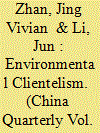

|
|
|
|
|
| Summary/Abstract |
China's environmental crackdowns under Xi Jinping have led to a sweeping shutdown of private enterprises. To circumvent this, enterprises have developed different survival strategies including direct lobbying to government officials and indirect lobbying through business associations. Based on comparative case studies of environmental lobbying in Chinese cities, our research finds that larger enterprises, enjoying more economic leverage, tend to lobby directly using their own political connections to sway environmental enforcement. By contrast, smaller enterprises are excluded from these clientelist networks and have to lobby through business associations, the effectiveness of which hinges on the support of large enterprises. Therefore, we argue that although the Chinese government's increasingly stringent environmental policies have shrunk the lobbying (and living) space for private enterprises, the existence of environmental clientelism protects economically powerful and politically connected private enterprises but sacrifices the others in the implementation of environmental policies.
|
|
|
|
|
|
|
|
|
|
|
|
|
|
|
|
| 7 |
ID:
137236
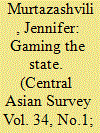

|
|
|
|
|
| Summary/Abstract |
The operation of a vibrant illicit economy and government corruption are widely acknowledged as obstacles to the post-conflict reconstruction of Afghanistan. However, massive influxes of money tied to the international efforts have led to ‘legal’ corruption that similarly obstructs state consolidation and peace. This paper considers the various ways in which Afghan entrepreneurs have learned to ‘game the state’ by taking advantage of donor and especially US procurement systems since 2001. The conceptual framework and evidence suggests that designing ways to limit corruption arising from the state-building process is key to improving the long-run prospects for post-conflict reconstruction in Afghanistan and similar states where rapid and steep increases in foreign aid and associated contracts create fertile ground for malfeasance.
|
|
|
|
|
|
|
|
|
|
|
|
|
|
|
|
| 8 |
ID:
163646
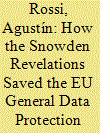

|
|
|
|
|
| Summary/Abstract |
Snowden’s global surveillance revelations inverted the direction of the European Parliament’s debate on the General Data Protection Regulation (GDPR). Before Snowden’s revelations, corporations were shaping Europe’s privacy rules. But when Snowden’s revelations raised the salience of Internet privacy issues, the power of corporations went down, and privacy advocates incorporated their preferences into the GDPR. Thus, the fact that Snowden was able to increase the salience of privacy issues was instrumental in defeating organised corporate power and enabling privacy advocates to mobilise Europe’s culture of privacy protection.
|
|
|
|
|
|
|
|
|
|
|
|
|
|
|
|
| 9 |
ID:
176749


|
|
|
|
|
| Summary/Abstract |
The current transformation of energy systems around the world is fundamentally a policy-driven process, unlike previous socio-technical transitions. This article focuses on the challenges of constructing forward-looking policies for sustainable energy transitions in the presence of powerful incumbent interests, through an in-depth study of how the emerging option of demand-side response (DSR) was incorporated into the Capacity Market (CM) for electricity in Great Britain over the period 2010 to 2014. Drawing on extensive documentation related to the development of the CM rules and interviews with participants and close observers of the process, the paper provides an unusually detailed assessment of the influence of companies with large electricity generation assets. The evidence presented supports the hypotheses that these companies had influence through deploying public facing strategies, that they had been able to draw on close networks of contacts and networks with senior policy makers, and that the latter had internalised the ideas and interests of the former. Despite counter-lobbying by DSR firms and non-governmental organisations, institutional arrangements gave major generators an advantage in terms of access. The paper concludes by recommending the establishment of independent bodies to propose policies and monitor the process of their development during energy system transformations.
|
|
|
|
|
|
|
|
|
|
|
|
|
|
|
|
| 10 |
ID:
140808
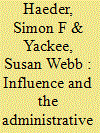

|
|
|
|
|
| Summary/Abstract |
All administrative processes contain points of entry for politics, and the U.S. president's use of the Office of Management and Budget (OMB) to review government regulations is no exception. Specifically, OMB review can open up a pathway for interest groups to lobby for policy change. We theorize that interest group lobbying can be influential during OMB review, especially when there is consensus across groups. We use a selection model to test our argument with more than 1,500 regulations written by federal agencies that were subjected to OMB review. We find that lobbying is associated with change during OMB review. We also demonstrate that, when only business groups lobby, we are more likely to see rule change; however, the same is not true for public interest groups. We supplement these results with illustrative examples suggesting that interest groups can, at times, use OMB review to influence the content of legally binding government regulations.
|
|
|
|
|
|
|
|
|
|
|
|
|
|
|
|
| 11 |
ID:
069794
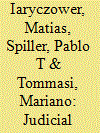

|
|
|
| 12 |
ID:
147492
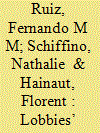

|
|
|
|
|
| Summary/Abstract |
Lobbyists may not share the same interests, but they usually agree to form a link in a network which could eventually be used to spread information, to search for potential partners, to speak with one voice to decision makers. In other words, social links represent value for lobbyists because they may ultimately facilitate access. In this article, we explore the network of the Security and Defense lobbies in the EU and we describe its structure.
|
|
|
|
|
|
|
|
|
|
|
|
|
|
|
|
| 13 |
ID:
069793
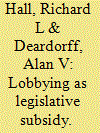

|
|
|
| 14 |
ID:
164261
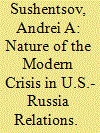

|
|
|
|
|
| Summary/Abstract |
The current state of U.S.-Russia relations is often compared with that of the Cold War. However, contradictions today between Moscow and Washington do not determine the dynamics of modern international relations. The confronta-tion between these two countries embraces all spheres (informational, eco-nomic, and political), resulting in a highly-dependent situation where conflict impacts all areas of cooperation. Relations between Russia and the United States сlearly manifest a psychological phenomenon known as fundamental attribution error that indicates a tendency towards explaining the behavior and actions of other people by their bad qualities and one’s own behavior by exter-nal circumstances. At the same time, the U.S-Russia confrontation is taking place against the background of a de facto political “civil war” within the Ameri-can establishment, which has greatly disrupted foreign policy decision-making in Washington.
|
|
|
|
|
|
|
|
|
|
|
|
|
|
|
|
| 15 |
ID:
166733
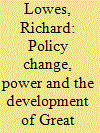

|
|
|
|
|
| Summary/Abstract |
The role of socio-political power is central to the development of policy, but systematic analyses of power associated with the development of energy policy are rare. Power is also an important yet somewhat under-researched aspect of socio-technical transitions research. The Renewable Heat Incentive (RHI) policy aims to increase deployment of low-carbon heat in Great Britain and begin a transformation to a low carbon GB heat system. This article analyses the socio-political power associated with the development of the RHI policy based on Lukes' ‘dimensions of power’ approach using a methodology based on triangulation. We identify a number of policy change episodes during the development of the RHI and describe the influence of key actors on the policy. Despite the common assumption of the power of incumbents, we show that those actors with niche technological expertise, close relationships with Government actors and actors within the administration have been the most powerful drivers of policy development and change. Niche actors sped up the introduction of the RHI scheme and have also had some success in increasing relative support for biomethane injection. The power of a civil servant to slow the introduction of the domestic element of the RHI has also been identified.
|
|
|
|
|
|
|
|
|
|
|
|
|
|
|
|
| 16 |
ID:
092390
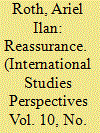

|
|
|
|
|
| Publication |
2009.
|
| Summary/Abstract |
This article argues that Israel experiences a unique perception of the perils of anarchy that drives it to a strategic preference for disproportionately offensive action against rivals and enemies. Actions taken pursuant to that doctrine have caused serious inconvenience to U.S. foreign policy in the Mideast for over four decades. This article argues that by reassuring Israel, both diplomatically and with arms sales, that the United States is committed to its survival, the United States has obtained significant measures of strategic restraint on Israel's part. That restraint has brought significant benefit to the United States as it seeks to guarantee regular access to the vital resources of the Middle East. This article provides examples of both successful reassurance and reassurance denied to illustrate the argument that U.S. support produces tangible strategic benefits for the United States
|
|
|
|
|
|
|
|
|
|
|
|
|
|
|
|
| 17 |
ID:
116670
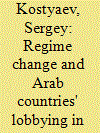

|
|
|
|
|
| Publication |
2013.
|
| Summary/Abstract |
In this article lobbying by several Arab countries in the United States is analyzed to answer two questions: What are the ramifications of a regime change for lobbying strategy in the United States? Does lobbying matter in securing US government support? First, the study demonstrates that regime change in Tunisia, Egypt and Libya has had no effect on their lobbying in the United States so far. The analysis of lobbying by countries which eschewed regime change-Bahrain, Saudi Arabia, and Pakistan-surprisingly comes to the same conclusion. Second, the ability of troubled regimes to peacefully control their own populace is more important for securing US support than lobbying.
|
|
|
|
|
|
|
|
|
|
|
|
|
|
|
|
| 18 |
ID:
129047
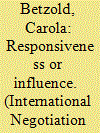

|
|
|
|
|
| Publication |
2014.
|
| Summary/Abstract |
This article analyzes the lobbying behavior of nongovernmental organizations (ngos) during international climate change negotiations.2 With limited resources, these ngos need to strategically invest their resources to maximize impact. A key decision concerns the target of lobbying efforts: Whom do ngos lobby, and why? Two possible explanations are contrasted: influence and responsiveness. Accordingly, ngos can focus on responsive targets that are likely to bring ngo input to the table or they can focus on influential targets whose voice is heard at the negotiation table. These two explanations are tested using data from a survey of ngos active in international climate change negotiations. I find that ngos strategically target their lobbying efforts, approaching both responsive and, more importantly, influential delegations. However, given that ngos primarily contact their home delegation, as well as the president of the negotiation session, further information on the nature and content of contacts between ngos and government delegations is necessary for understanding ngo-government interactions in international climate change negotiations.
|
|
|
|
|
|
|
|
|
|
|
|
|
|
|
|
| 19 |
ID:
098448
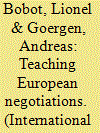

|
|
|
|
|
| Publication |
2010.
|
| Summary/Abstract |
The European Union is probably the most complex political and institutional decision-making structure known to humankind. Nowadays, scholars increasingly agree that no single theory can explain all the mechanisms at work in the system of EU governance and decision-making at all levels in any satisfactory way. Even for trained experts and specialists, the complexity of the EU machinery is extremely difficult to grasp. The extensive academic debate in this area is an indicator for both the sophistication of the scholarly discussion and the uncertainty of those who are trying to understand and explain the European integration project. For students who are just learning about the field, trying to untangle that complexity is even more challenging. The difficult task for teachers and instructors is finding ways to introduce students to the institutional framework and the related legislative processes of EU decision-making, and thereby help to facilitate their understanding of the nature of the Union. The purpose of this study is to suggest an alternative teaching method. The simulation "EU Chocolate Directive," can provide participants with the tools necessary to negotiate more effectively at the EU level.
|
|
|
|
|
|
|
|
|
|
|
|
|
|
|
|
| 20 |
ID:
191897
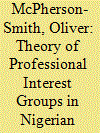

|
|
|
|
|
| Summary/Abstract |
Professional or industry-based interest groups have long been a feature of the Nigerian political landscape. Nevertheless, studies of these interest groups in Nigerian politics have largely privileged the analysis of individual groups or considered their collective role in the democratic transition of the 1990s. By returning the scholarly focus to their raison d’être, namely, their shared economic concerns, this article offers a comprehensive theory of interest groups in Nigerian politics. This novel theory posits that federal-level interest groups draw their membership from across Nigeria’s diverse ethnic, regional, and class constituencies due to their common economic concerns. Moreover, these groups actively lobby the federal government in pursuit of their economic advantage, often in direct competition with each other. Neither aloof from nor coopted by the state, the most prominent interest groups in Nigeria enjoy formalized positions within the bureaucracy from which to exert their influence and pursue the unique interests of their members. To develop this theory, this article employs new data and documents on the lobbying efforts of interest groups during the reform process of corporate law in Nigeria across a thirty-year period. Elite interviews, previously unpublished documents, and archival legal documents evidence their lobbying efforts. Examining the reform of corporate law across Nigeria’s later military regimes and the democratic Fourth Republic (1999–present) demonstrates the relevance of this theory of interest groups for both historical and contemporary understandings of Nigerian politics.
|
|
|
|
|
|
|
|
|
|
|
|
|
|
|
|
|
|
|
|
|